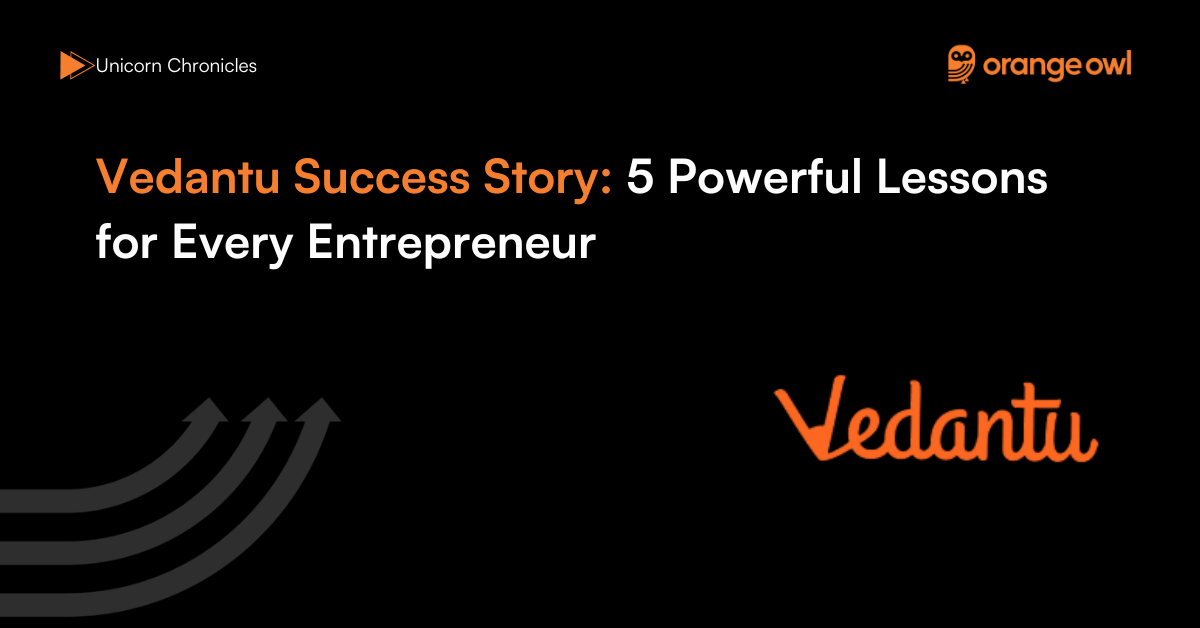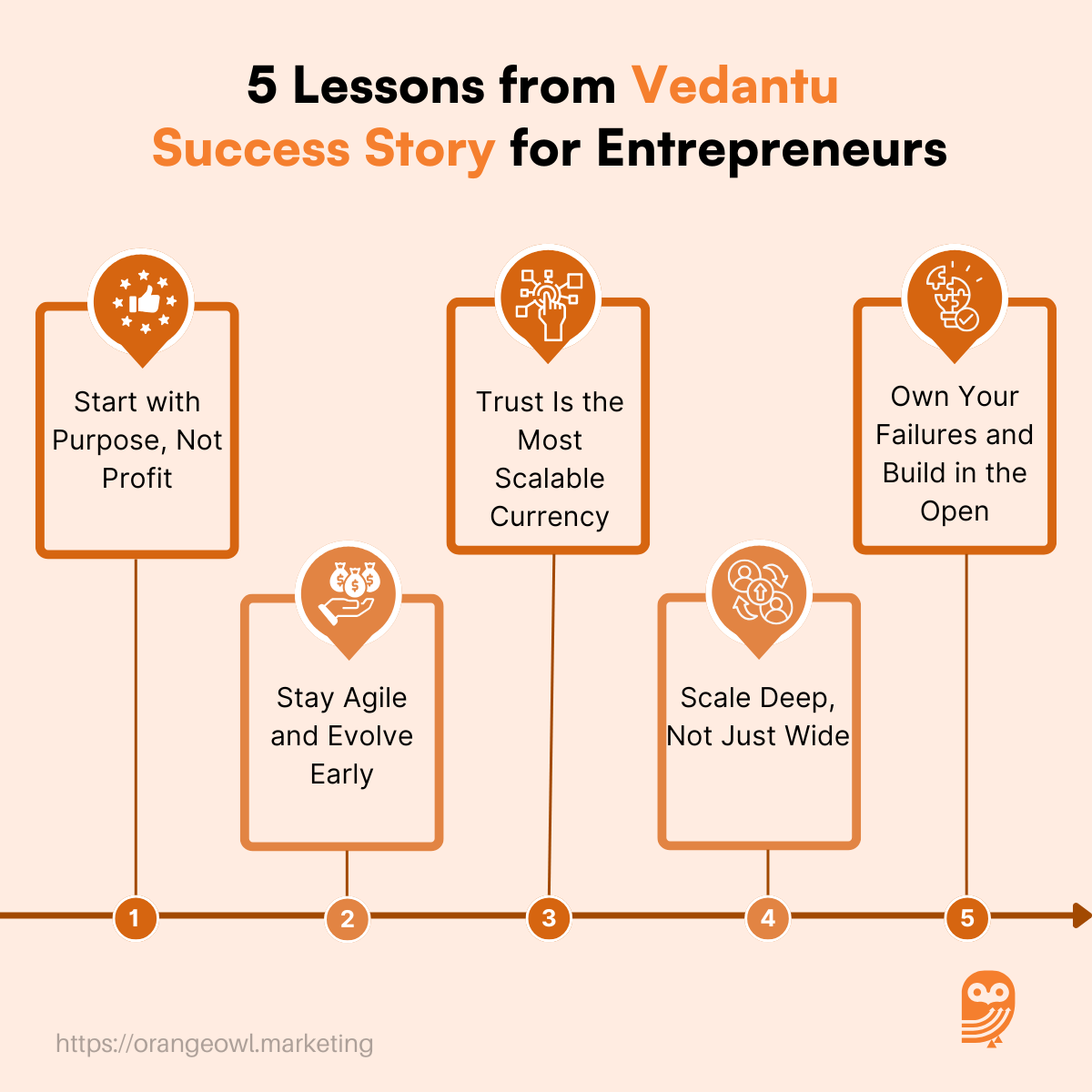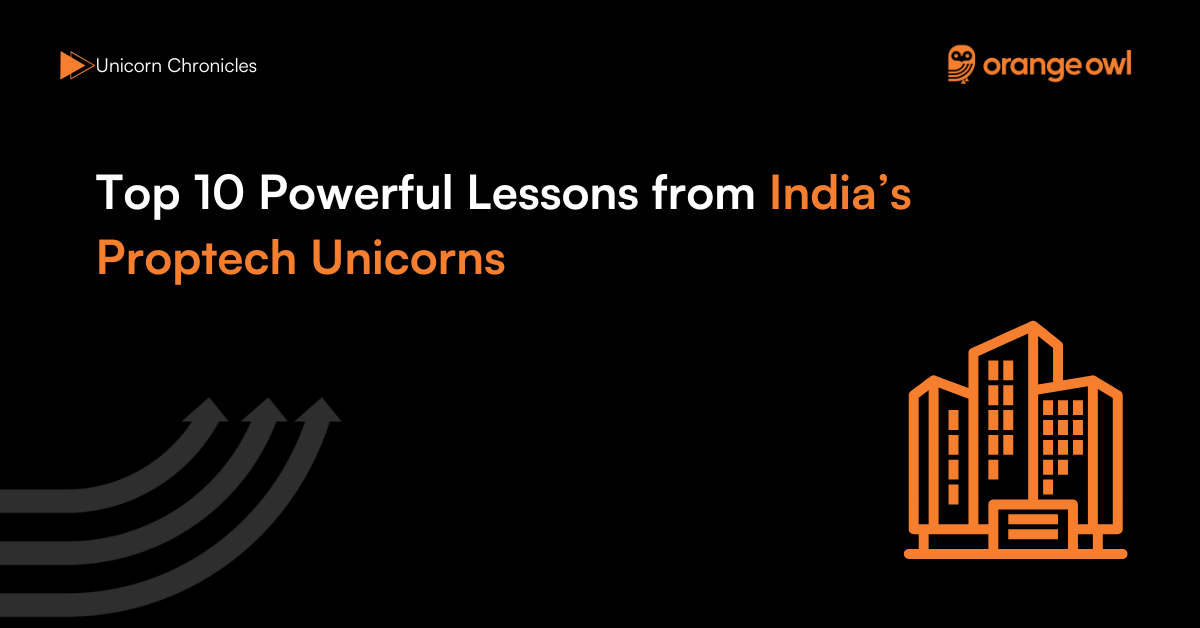Vedantu Success Story: 5 Powerful Lessons for Every Entrepreneur
Vivek Goel
June 17, 2025

Table of Contents
Introduction
In the ever-evolving landscape of Indian edtech, Vedantu has carved a niche as one of the pioneering players transforming how students learn and teachers teach. Founded in 2011 by IIT alumni Pulkit Jain, Anand Prakash, Saurabh Saxena, and Vamsi Krishna, Vedantu began as a vision to bring quality education to every corner of the country through the power of live online teaching. Over a decade later, that vision has matured into a formidable force in the Indian education sector.
Headquartered in Bengaluru, Vedantu operates as an online learning platform offering live classes and offline centres for K1 to K12 students. With backing from marquee investors like Accel, Tiger Global Management, and WestBridge Capital, the company has raised $326 million and currently boasts a valuation of ₹7,650 crore (approximately $920 million as of 2024), firmly establishing its place in India’s unicorn club.
What truly sets Vedantu’s success story apart is its early bet on live interactive learning—a model that prioritised real-time engagement between students and teachers long before it became the industry norm. Unlike recorded lessons or passive video tutorials, Vedantu’s platform fostered a virtual classroom experience that mimicked offline learning but with the flexibility and accessibility of the digital world. This innovation, combined with a deep understanding of Indian learners’ needs, positioned Vedantu as a trusted name in both metro cities and smaller towns alike.
Origin Story
The genesis of the Vedantu success story is deeply rooted in the founders’ real-world experiences with India’s education system, particularly its uneven access and inconsistent quality across regions. Vamsi Krishna, one of the co-founders, began his journey as an educator right after graduating from IIT Bombay, choosing to teach students in Barnala, a small town in Punjab. There, he saw firsthand how bright and motivated students were being held back by limited access to good teachers and learning resources. This sparked a conviction that education should not be constrained by geography.
That small offline initiative, known as Lakshya, grew into a reputed coaching institute but left Vamsi and his co-founders — Pulkit Jain, Anand Prakash, and Saurabh Saxena (all fellow IITians and passionate educators) — with a lingering realisation: scaling physical education infrastructure would always have limitations. What India needed was a solution that could bridge the gap between passionate teachers and students across the country, using technology as the conduit.
Thus, Vedantu was born in 2011, out of both necessity and vision. The founding team shared a unified belief that “every child deserves access to the best teachers, regardless of where they live.” The name itself, “Vedantu,” combines “Veda” (knowledge) and “Tantu” (network), symbolising their mission to build a knowledge network for the country.
Initially, Vedantu focused on live online tutoring, something considered revolutionary at the time. They envisioned a future where students could receive personalised, interactive, and high-quality education from the comfort of their homes. Long before terms like “edtech” and “live classes” became mainstream, Vedantu was laying the groundwork for what would eventually become a dominant model in Indian education.
Looking back, Vamsi Krishna reflects on their mission:
“We didn’t set out to build a billion-dollar company. We wanted to solve a billion-dollar problem — giving every child in India a fair shot at success.”
This founding mission continues to shape the Vedantu success story — from live online classrooms to hybrid learning models — always driven by the same vision: democratizing education in India, one student at a time.
Business Space and Early Challenges
Vedantu operates at the forefront of India’s edtech revolution, bridging the educational divide by offering live online tutoring to K-12 students across the country. Positioned in a fast-evolving sector, Vedantu differentiates itself through its interactive, real-time classes, accessible not just in urban areas but also in tier-2 and tier-3 towns, where quality education has historically been out of reach.
By building a platform that could scale quality education across geographies, the Vedantu success story began disrupting an industry long dominated by offline coaching centres and rigid classroom formats. The founders identified a glaring gap: accessibility, affordability, and engagement in traditional learning models were limited, especially for students preparing for competitive exams like JEE and NEET.
Yet, the road to becoming a Vedantu success story was riddled with early hurdles. One of the biggest challenges was winning trust. Parents and students were sceptical of online learning as a viable alternative to conventional schooling. This resistance to change, coupled with concerns around internet reliability, teacher quality, and student attention spans, posed a serious roadblock.
From a technology perspective, delivering live, two-way interactive sessions in low-bandwidth regions required breakthrough innovation. Vedantu responded by developing its own proprietary WAVE (Whiteboard Audio Video Environment) technology, ensuring low-latency video, real-time doubt solving, and personalised learning—a leap that allowed them to mimic the intimacy of a physical classroom in a digital space.
Another challenge was scaling the teacher base. Unlike pre-recorded courses, live teaching demanded highly trained, camera-ready educators who could engage students in real time. Vedantu invested heavily in teacher onboarding, digital pedagogy training, and content standardisation to maintain academic rigour at scale.
Despite these initial struggles, Vedantu remained steadfast in its mission. Through continuous product innovation, student-first design, and data-driven personalisation, the platform built a strong user base and gained traction nationwide. Its early battles laid the foundation for what would become one of India’s most inspiring edtech journeys — a journey that transformed into the Vedantu success story, influencing millions of students and reshaping how India learns.
Growth Strategies
The Vedantu success story is deeply rooted in its bold vision to democratize education and a series of calculated, high-impact growth strategies. From a startup offering live classes to a household name in Indian edtech, Vedantu’s evolution showcases a masterclass in product-market fit, strategic capital deployment, and technology-driven innovation.
At the heart of its growth was a laser-sharp focus on live, interactive learning. While many edtech platforms leaned into pre-recorded content, Vedantu doubled down on real-time teaching. This was a deliberate differentiation strategy — one that allowed deeper engagement and personalised doubt-solving. The proprietary WAVE technology gave the platform a competitive edge, offering low-latency video streaming and a collaborative digital whiteboard, recreating the physical classroom experience online.
To scale operations, Vedantu executed a series of well-timed funding rounds, raising over $326 million from marquee investors such as Accel, Tiger Global Management, and WestBridge Capital. These funds were strategically funnelled into teacher acquisition, content development, and student onboarding. Additionally, a large chunk of the capital went toward expanding hybrid operations, with Vedantu setting up offline experience centres to cater to students who preferred a blended model of online and in-person learning.
Another unique growth lever in the Vedantu success story was its freemium model, which allowed students to attend live classes for free, thereby building trust before monetisation. This approach led to massive organic traffic, particularly from Tier 2 and Tier 3 cities, and widened the platform’s reach to students beyond urban centres.
In a bold and early move, Vedantu also entered the test prep market for competitive exams like JEE, NEET, NTSE, and Olympiads, further enhancing its value proposition. These high-stakes exam segments not only increased user stickiness but also drove strong word-of-mouth referrals, turning students into evangelists.
Metrics back the success story of Vedantu. The platform has touched over 40 million students, with more than 500,000 paying subscribers. Even in a crowded and competitive landscape, Vedantu became one of the first edtech startups to turn profitable on a contribution margin level, a rare feat in the sector.
In parallel, Vedantu launched Vedantu Superkids, an offering focused on early learners from KG to Class 5. This strategic diversification allowed the company to build an end-to-end learning ecosystem, capturing students at a younger age and retaining them through their academic journey.
Through a combination of tech-first execution, deep user empathy, and strategic capital deployment, Vedantu scaled rapidly, eventually achieving a valuation of ₹7,650 Cr and solidifying its place as a definitive Vedantu success story in Indian edtech.
Marketing Strategies
The success story of Vedantu is not just a tale of academic excellence—it’s also a case study in bold, high-impact marketing that redefined how edtech brands connect with students and parents. In an industry traditionally reliant on printed flyers, coaching centre hoardings, and word-of-mouth promotions, Vedantu chose a digital-first, emotion-led, and performance-backed marketing approach.
One of Vedantu’s standout strategies was its focus on authentic, student-centred storytelling. The platform regularly shared real testimonials of learners who cracked top-tier exams like JEE and NEET through Vedantu’s mentorship. These stories didn’t just highlight academic results—they reflected personal growth, resilience, and transformation, helping the brand build emotional credibility and trust.
Vedantu’s big moment came with its high-profile campaigns like “Samadhan” and “The Everything Class”, which were amplified through TV commercials, YouTube ads, and OTT integrations. These campaigns were backed by celebrity endorsements, most notably by Bollywood actor Aamir Khan, who served as Vedantu’s brand ambassador. His image as a socially conscious educator aligned seamlessly with Vedantu’s mission of delivering quality education at scale, adding aspirational and trustworthy appeal to the brand.
The company also made a strategic bet on regional language content, creating hyper-localised YouTube channels and social media campaigns to reach students from Tier 2 and Tier 3 cities. Whether it was a Tamil JEE revision series or a motivational Hindi podcast for Class 10 board students, Vedantu ensured that every child, regardless of geography, felt seen and supported.
Vedantu’s digital marketing engine ran deep and wide—Instagram reels, YouTube shorts, Telegram communities, and even gamified quizzes formed part of its funnel. These platforms not only drove user acquisition but also fostered a strong sense of community among learners.
Another key lever was content marketing through thought leadership. Vedantu’s co-founders frequently participated in webinars, interviews, and educational forums, positioning the brand as a pioneer in live learning. The emphasis wasn’t just on product promotion—it was on shifting public perception around online education.
In terms of retention and engagement, referral programs and in-app gamification played a powerful role. Students earned rewards for inviting peers, attending classes, and hitting learning milestones. These features made learning feel more like a collaborative journey than a solitary task.
What truly sets Vedantu apart is how it turned marketing into a mission-driven storytelling engine, combining massive reach with local relevance, and celebrity influence with grassroots authenticity. This unique blend not only propelled the platform to unicorn status but also cemented its place in the hearts of millions of Indian students and parents alike.
Strategic Lessons for Every Entrepreneur
1. Start with Purpose, Not Profit
Vedantu wasn’t born out of a desire to ride the edtech wave—it was driven by a deep-rooted purpose: making quality education accessible to every Indian child, regardless of geography or income. Vamsi Krishna and his co-founders had firsthand experience teaching students in underserved areas. What they saw was a broken, exam-centric system that left millions behind.
“Our goal was to democratise education, not just digitise it.” – Vamsi Krishna
This relentless focus on mission over monetisation enabled Vedantu to build products with impact at their core, offering free classes during COVID, pioneering live learning, and launching regional content. For any entrepreneur, the lesson is clear: profit follows purpose, not the other way around.
2. Stay Agile and Evolve Early
Vedantu began as a tutoring platform for students in small towns, but the team quickly recognised that online live classes could revolutionise learning. Long before Zoom became mainstream, Vedantu built its live learning platform (WAVE), enabling real-time interaction, doubt-solving, and performance tracking.
“We knew the future of education wasn’t pre-recorded videos—it was engagement.” – Pulkit Jain
This early pivot to live learning was a game-changer. It set Vedantu apart from competitors and became its moat. Entrepreneurs must remember: if the market shifts, don’t wait—evolve fast. Timing and agility can be the difference between relevance and redundancy.
3. Trust Is the Most Scalable Currency
In a space flooded with promises and promotional noise, Vedantu stood out by building trust with students, parents, and educators. During the pandemic, it offered free live classes to over 150,000 students daily, even when monetisation seemed uncertain. This bold move wasn’t a campaign—it was a commitment.
“In education, trust is everything. If parents believe in you, they’ll stay with you for years.” – Anand Prakash
By choosing authenticity over aggressive sales, Vedantu created lifelong advocates. Entrepreneurs should learn: build goodwill first—the ROI will come.
4. Scale Deep, Not Just Wide
While many edtech companies tried to serve everyone, Vedantu focused on depth within K–12 learning, mastering core subjects, and targeting students preparing for high-stakes exams like JEE and NEET. Instead of spreading thin, it chose to own its niche.
“We didn’t want to do everything. We wanted to do a few things exceptionally well.” – Vamsi Krishna
This depth-over-breadth strategy helped Vedantu build strong outcomes, teacher quality, and brand authority. The entrepreneurial takeaway: Conquer a niche before you conquer the market.
5. Own Your Failures and Build in the Open
Vedantu’s journey hasn’t been without stumbles—from fierce competition and funding winters to shifts in learning patterns post-COVID. But what sets the team apart is their transparency—in investor calls, founder blogs, and public interviews, they’ve shared missteps with honesty.
“There’s no shame in admitting what didn’t work. That’s how you build a resilient team and a relatable brand.” – Saurabh Saxena
In today’s ecosystem, authenticity beats perfection. Entrepreneurs should take note: own your narrative—the highs and the lows. It builds trust, humanises your brand, and attracts people who believe in your mission.
Conclusion
Vedantu’s story is more than just the success story of an edtech unicorn—it’s a powerful reminder of what happens when purpose meets innovation, and when impact is placed above vanity metrics. In an industry often driven by flashy apps and aggressive marketing, Vedantu chose a different path: one grounded in deep empathy for students, relentless product innovation, and a mission to democratise education in India.
Through pioneering live online classes, launching India’s first real-time virtual learning platform (WAVE), and staying committed to accessibility, especially during the pandemic, Vedantu reimagined what learning could look like for millions of students. Its trust-first model, strategic agility, and authentic storytelling set it apart in a crowded and competitive market.
“We were never building for just cities. We were building for every child who deserved a better chance at learning.” – Vamsi Krishna
This quote reflects the very soul of Vedantu: education as empowerment. It’s not just a platform—it’s a movement, a mission to level the playing field for students across socioeconomic divides.
As the edtech sector evolves post-COVID and hybrid learning gains traction, Vedantu stands poised to blend online scalability with offline depth through its growing network of learning centres. The future promises new frontiers—AI-driven personalisation, regional content expansion, and deeper exam prep offerings.
But more than anything, Vedantu’s rise is a beacon for entrepreneurs. It teaches us that tech is only as powerful as the problem it solves, and that sustainable success is rooted in sincerity. Whether you’re an early-stage founder or a dreamer with a problem to fix, Vedantu’s journey urges you to stay mission-driven, build with integrity, and always put the user first.
Because in the end, education isn’t just a market—it’s a legacy.



